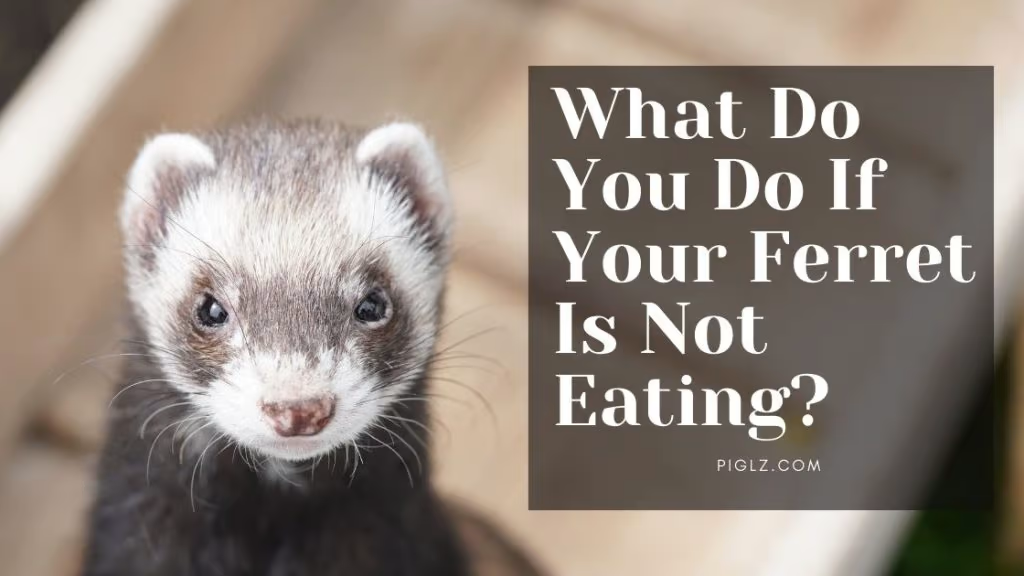If your ferret is not eating, you need to investigate the problem. It could be something as simple as not having a healthy diet. In this article, we will cover how to provide a variety of foods, the downsides of giving it a lower-quality diet, and routine veterinary care. If your ferret refuses to eat, contact your veterinarian to find out the cause of its malaise.

Providing a variety of food
If your ferret refuses to eat, you should take him to the vet for a proper diagnosis. He may even be licking the tip of a syringe. Once there, you should tell the vet about your current concerns and provide him with a variety of food.
Your veterinarian may also prescribe medication to combat inflammation and stimulate his appetite. However, you should know that if you bring your ferret to the veterinary clinic, the doctor may suggest that you leave the ferret there overnight. If that is the case, you should be aware of the limitations of this option.
You should closely monitor your ferret during the diagnostic process to diagnose the problem. You can help the vet identify the problem by describing the behavior. For example, if your ferret is drooling or exhibiting lethargy, you can explain how the lethargy could be a sign of discomfort and/or an overactive immune system. If your ferret is not eating, it may be dehydrated, and the veterinarian will prescribe additional fluids.
Providing a lower quality food
The best way to tell if your ferret is not eating is to observe the performance of the pet. Look for bright eyes, silky hair, and supple skin. Small, well-formed stools are also a sign of good food quality. A higher-quality diet should have no strong odor. A lower-quality diet may be to blame if your ferret isn’t eating.
While you’re at it, remember that your ferret needs plenty of water. Ferrets require a lot of water, especially if their diet contains high protein content. Provide fresh, clean water throughout the day, and avoid water with high concentrations of chemicals. Providing a lower-quality diet may lead to dehydration or poor health in your ferret.

Giving your ferret a lower quality diet
If your pet ferret is not eating normally, you need to find out the cause and take appropriate action. You should immediately consult a veterinarian if your pet is not eating, even if it is not in a critical condition. If you notice that your ferret grinds its teeth when it is empty or if it is urinating blood, it may have ulcers and need urgent medical attention. Urine may be dark or bloody; bright red or black colored; this is indicative of lower G.I. ulcers. A higher-quality diet will be more suitable for your ferret if you observe these symptoms in your pet.
Ferrets need high-quality protein, and a diet rich in meat meals is the best choice. Vegetable-based proteins are not digestible and may cause bladder stones. Other poor-quality protein sources include by-products and corn gluten meal. Make sure the first ingredient in your ferret’s food is meat meals. Never give your ferret vegetable-based proteins.
Providing it with routine veterinary care
Providing your ferret with routine veterinarian care is extremely important. Although many ferrets do not display any visible signs of illness, they can be highly susceptible to various diseases. In addition to developing anemia or heart disease, ferrets can also suffer from parasitic infections, such as intestinal worms and heartworms. Thankfully, many of these diseases can be treated or prevented through routine visits to the veterinarian.
In addition to ensuring your ferret receives routine veterinary care, you should also take the time to visit a veterinarian for behavioral issues. Behavioral problems in ferrets are often a sign of a more serious illness, and a veterinarian should be able to spot them early.
The goal of routine care is to keep your ferret healthy and safe for many years to come. Veterinary professionals can provide regular wellness exams and preventative measures, as well as recommend dietary and behavioral changes that can prevent or solve a ferret’s health issues.

Final tips
If your ferret isn’t eating, it could be because of a respiratory infection or a gastrointestinal issue. If your ferret is coughing up hairballs, keep some Lax or petrolatum on hand.
Lax helps the hairballs pass through your ferret’s system. This remedy may be necessary once a week or more.
If your ferret isn’t eating due to a digestive disorder, you may be overfeeding it. While it’s tempting to give your ferret a piece of meat, it’s not healthy for it. Besides being unhealthful for your ferret, human food can also upset your pet’s stomach and digestive system. Ferrets require frequent small meals with balanced nutrition.


